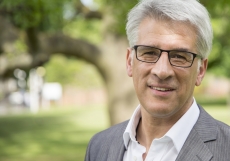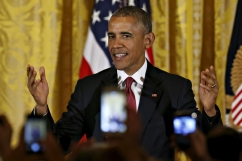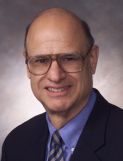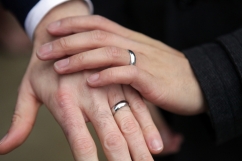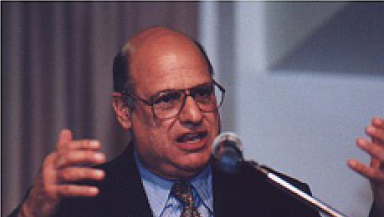
Yesterday the Grand Old Man of evangelical activism, Tony Campolo, sent shock waves around the Christian world by announcing that he had changed his mind about homosexuality.
Campolo had long been known as a 'bridge' figure on the issue, encouraging the Church to reach out to and seek to understand gay and lesbian people while stopping short of endorsing their sexual relationships. His dialogues with his wife Peggy, who took a more affirming line, were popular and appealing explorations of the theme.
Now, though, Campolo has apparently switched. He says on his blog: "It has taken countless hours of prayer, study, conversation and emotional turmoil to bring me to the place where I am finally ready to call for the full acceptance of Christian gay couples into the Church."
Campolo is the latest in an increasingly long line of evangelicals to announce their support for same-sex relationships. In the UK, Steve Chalke announced his change of heart in January 2013 . The move eventually led to the removal of his Oasis Trust from membership of the Evangelical Alliance. Former worship leader Vicky Beeching came out as gay in August 2014 which revealed the extent of her personal trauma over her identity. In the US, author, presenter and former megachurch pastor Rob Bell said in an Oprah Winfrey interview that the Church was "moments away" from accepting gay marriage.
But Campolo's defection is the heaviest blow so far to the conservative cause, because of his personal standing and because he has publicly held a traditionalist line for so many years.
So is the evangelical consensus finally cracking?
It would be satisfying to be able to answer with a straight 'yes' or 'no', but the answer is more complicated than that.
Some reactions to his announcement were to be expected. Beeching tweeted that it was "fantastic news". Gay Christian networks welcomed it. On the other hand, social media was also awash with comments from Christians accusing Campolo of selling out: "Who cares what this wishy washy pastor says. What matters is what God says!!", "The pace of apostasy in America is heartbreaking" and "Tony Campolo has lost his way".
Referring to Campolo's reference to the Church's acceptance of women preachers, another Twitter user says: "The difference between women in the church and homosexuality is the Bible says gays will GO TO HELL. It's not a suggestion."
Others responded in a rather more measured way. Conservative commentator Denny Burk, who teaches biblical studies at the Southern Baptist Theological Seminary in Louisville, Kentucky, wrote on his blog that Campolo "seems to have been moved not by scripture but by relationships he's had with gay friends". He continued: "The winnowing process that we are witnessing right now is going to reveal whose consciences are bound by the authority of scripture and whose aren't."
Burk also takes issue with Campolo's comparison of Church teaching on homosexuality to its teaching on "the women's issue" (sic) and on slavery. He says that it's a poor argument and that it "makes traditional marriage supporters into the moral equivalent of misogynists and racists".
Burk articulates the traditional conservative position on homosexuality, and his arguments will be followed by many others. However, he also points to what he regards as a troubling contradiction in Campolo's statement, which speaks of gay Christian "couples" without specifying marriage. "If he is now supporting unmarried gay couples as full members, does he also believe that churches should accept unmarried heterosexual couples as well?" asks Burk.
This is arguably reading rather too much into the statement, which is not a systematic theology of sexuality (and Campolo has a whole paragraph about the nature of marriage in his piece). However, it does focus attention on what Campolo does and doesn't say, which has been criticised from the pro-gay position as well as the traditionalist.
Gay author Brandan Robertson, whose book deal with a Christian publisher was cancelled after he came out, wrote that in spite of this "great step forward", it was "not enough that Christian leaders simply step forward and announce their support for gay and lesbian Christians".
"It's also important that they acknowledge the harm that has been caused by their use of an un-affirming theology and that they publicly repent for their sin of exclusion," he said.
He also wrote that Campolo addressed only gay and lesbian people, "without acknowledging bisexual, queer, and trans people. For far too long, in both the Church and the broader LGBTQ community, these minorities have felt invisible. When Christians are moved to announce their support for inclusion, it is also essential that they include all sexual minorities. Otherwise, the oppressive cycle of invisibility will be perpetuated."
Another commentator, Eliel Cruz, also welcomed Campolo's statement. However, he said: "But look at what he doesn't say. Perhaps it was an extremely large oversight but Campolo never once said that same-sex intimacy is not a sin neither does he say that he unequivocally affirms same-sex relationships. All he promoted was that Christian gay couples should be welcomed."
He also notes that bisexual and transgender Christians are not mentioned and that Campolo doesn't use the LGBTQ acronym, and like Robertson, calls for an apology.
Reading the initial responses to Campolo's announcement, it's hard to avoid the conclusion that very little in the take-no-prisoners approach which this subject generates has changed. For traditionalists, his acceptance of the equivalence of heterosexual and homosexual marriage puts him beyond the evangelical pale. For progressives, his insistence on the importance of marriage and fidelity makes him a terrible reactionary.
Does his statement in itself mark a watershed moment? Probably not. While Campolo regards himself as a conservative, his support for what in the US are seen as left-wing ideas and his deep concern for social justice have long led him to be seen as a dangerous liberal in many quarters. His endorsement of same-sex relationships is perhaps unlikely to convince anyone who was not already convinced.
Neverthless, there is a tide running against traditionalist views on homosexuality in America, and it is unquestionably affecting the Church as well. A Pew Research survey released yesterday found that support for same-sex marriage was at a record high, with 57 per cent of the population in favour and 39 per cent against. Only five years ago, more opposed it (48 per cent) than were in favour (42 per cent).
When the figures are broken down further, the size of the mountain that traditionalists are facing is even more apparent. Nearly three-quarters of 18-34-year-olds favour legal recognition. In religious terms, majorities of both Catholics and mainline Protestants support it. The resistance is coming from white evangelicals, only 27 per cent of whom support it, but with the inevitable generational shift, that resistance appears almost certain to weaken.
What the outcome will be is difficult to forecast, but a likely scenario is an evangelical wing of the Church increasingly embattled and marginalised. For conservative evangelicals, though, this is a price worth paying: opposition to homosexuality is a matter of faithfulness to the Bible. Attempts to re-read the texts condemning such behaviour are simply selling out to the spirit of the age, and Campolo is a casualty in the struggle for truth.
In reality, however, both sides are left with unanswered questions, which Campolo's position epitomises. Steve Chalke hosted a gathering entitled Open Church in April, billed as a conversation about "inclusive Church". Campolo was one of the participants. Among other things, he said that he didn't understand how Anglicans could be so split on the subject of homosexuality while it was happy to have bishops who didn't believe in the resurrection – in other words, we should get our theological priorities right. He also said that homosexuality was a terrible distraction from the real defining issue for our times: justice for the poor.
Many Christians would cheer him to the rafters for saying things like this. However, he also talked through the so-called "clobber passages" which appear to denounce, in unambiguous and irrefutable terms, sex with people of the same gender, and explained why he couldn't square them with an acceptance of same-sex relationships. In his announcement yesterday, he says: "Rest assured that I have already heard – and in some cases made – every kind of biblical argument against gay marriage." What he doesn't do is say how he believes those arguments fall down – and until there is a biblical case for inclusion that can convince conservatives that there is at least room for accommodation, the theological trench warfare looks set to continue.
Follow @RevMarkWoods on Twitter.










